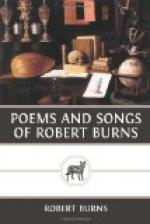The clachan yill had
made me canty,
I was na fou, but just
had plenty;
I stacher’d whiles,
but yet too tent aye
To free the ditches;
An’ hillocks,
stanes, an’ bushes, kenn’d eye
Frae ghaists an’
witches.
The rising moon began
to glowre
The distant Cumnock
hills out-owre:
To count her horns,
wi’ a my pow’r,
I set mysel’;
But whether she had
three or four,
I cou’d na tell.
I was come round about
the hill,
An’ todlin down
on Willie’s mill,
Setting my staff wi’
a’ my skill,
To keep me sicker;
Tho’ leeward whiles,
against my will,
I took a bicker.
I there wi’ Something
did forgather,
That pat me in an eerie
swither;
An’ awfu’
scythe, out-owre ae shouther,
Clear-dangling, hang;
A three-tae’d
leister on the ither
Lay, large an’
lang.
Its stature seem’d
lang Scotch ells twa,
The queerest shape that
e’er I saw,
For fient a wame it
had ava;
And then its shanks,
They were as thin, as
sharp an’ sma’
As cheeks o’ branks.
“Guid-een,”
quo’ I; “Friend! hae ye been mawin,
When ither folk are
busy sawin!"^1
I seem’d to make
a kind o’ stan’
But naething spak;
At length, says I, “Friend!
whare ye gaun?
Will ye go back?”
It spak right howe,—“My
name is Death,
But be na fley’d.”—Quoth
I, “Guid faith,
Ye’re maybe come
to stap my breath;
But tent me, billie;
I red ye weel, tak care
o’ skaith
See, there’s a
gully!”
“Gudeman,”
quo’ he, “put up your whittle,
I’m no designed
to try its mettle;
But if I did, I wad
be kittle
To be mislear’d;
I wad na mind it, no
that spittle
Out-owre my beard.”
“Weel, weel!”
says I, “a bargain be’t;
Come, gie’s your
hand, an’ sae we’re gree’t;
We’ll ease our
shanks an tak a seat—
Come, gie’s your
news;
This while ye hae been
mony a gate,
At mony a house."^2
[Footnote 1: This recontre happened in seed-time, 1785.—R.B.]
[Footnote 2: An
epidemical fever was then raging in that
country.—R.B.]
“Ay, ay!”
quo’ he, an’ shook his head,
“It’s e’en
a lang, lang time indeed
Sin’ I began to
nick the thread,
An’ choke the
breath:
Folk maun do something
for their bread,
An’ sae maun Death.
“Sax thousand
years are near-hand fled
Sin’ I was to
the butching bred,
An’ mony a scheme
in vain’s been laid,
To stap or scar me;
Till ane Hornbook’s^3
ta’en up the trade,
And faith! he’ll
waur me.
“Ye ken Hornbook
i’ the clachan,
Deil mak his king’s-hood
in spleuchan!
He’s grown sae
weel acquaint wi’ Buchan^4
And ither chaps,
The weans haud out their
fingers laughin,
An’ pouk my hips.




